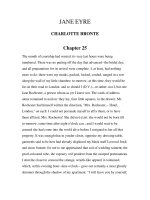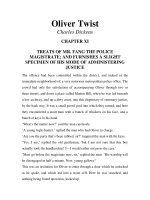LUYỆN ĐỌC TIẾNG ANH QUA TÁC PHẨM VĂN HỌC-JOURNEY TO THE CENTER OF THE EARTH -JULES VERNE- CHAPTER 42 docx
Bạn đang xem bản rút gọn của tài liệu. Xem và tải ngay bản đầy đủ của tài liệu tại đây (20.77 KB, 9 trang )
JOURNEY TO THE CENTER OF THE EARTH
JULES VERNE
CHAPTER 42
HEADLONG SPEED UPWARD THROUGH THE
HORRORS OF DARKNESS
It might have been, as I guessed, about ten at night. The first of mysenses
which came into play after this last bout was that of hearing.All at once I
could hear; and it was a real exercise of the sense ofhearing. I could hear the
silence in the gallery after the din whichfor hours had stunned me. At last
these words of my uncle's came tome like a vague murmuring:
"We are going up."
"What do you mean?" I cried.
"Yes, we are going up - up!"
I stretched out my arm. I touched the wall, and drew back my handbleeding.
We were ascending with extreme rapidity.
"The torch! The torch!" cried the Professor.
Not without difficulty Hans succeeded in lighting the torch; and theflame,
preserving its upward tendency, threw enough light to show uswhat kind of a
place we were in.
"Just as I thought," said the Professor "We are in a tunnel notfour-and-
twenty feet in diameter The water had reached the bottom ofthe gulf. It is
now rising to its level, and carrying us with it."
"Where to?"
"I cannot tell; but we must be ready for anything. We are mounting ata speed
which seems to me of fourteen feet in a second, or ten milesan hour. At this
rate we shall get on."
"Yes, if nothing stops us; if this well has an aperture. But supposeit to be
stopped. If the air is condensed by the pressure of thiscolumn of water we
shall be crushed."
"Axel," replied the Professor with perfect coolness, "our situationis almost
desperate; but there are some chances of deliverance, andit is these that I am
considering. If at every instant we may perish,so at every instant we may be
saved. Let us then be prepared to seizeupon the smallest advantage."
"But what shall we do now?"
"Recruit our strength by eating."
At these words I fixed a haggard eye upon my uncle. That which I hadbeen
so unwilling to confess at last had to be told.
"Eat, did you say?"
"Yes, at once."
The Professor added a few words in Danish, but Hans shook his
headmournfully.
"What!" cried my uncle. "Have we lost our provisions?"
"Yes; here is all we have left; one bit of salt meat for the three."
My uncle stared at me as if he could not understand.
"Well," said I, "do you think we have any chance of being saved?"
My question was unanswered.
An hour passed away. I began to feel the pangs of a violent hunger.My
companions were suffering too, and not one of us dared touch thiswretched
remnant of our goodly store.
But now we were mounting up with excessive speed. Sometimes the
airwould cut our breath short, as is experienced by aeronauts ascendingtoo
rapidly. But whilst they suffer from cold in proportion to theirrise, we were
beginning to feel a contrary effect. The heat wasincreasing in a manner to
cause us the most fearful anxiety, andcertainly the temperature was at this
moment at the height of 100°Fahr.
What could be the meaning of such a change? Up to this time facts
hadsupported the theories of Davy and of Liedenbrock; until nowparticular
conditions of non-conducting rocks, electricity andmagnetism, had tempered
the laws of nature, giving us only amoderately warm climate, for the theory
of a central fire remained inmy estimation the only one that was true and
explicable. Were we thenturning back to where the phenomena of central
heat ruled in alltheir rigour and would reduce the most refractory rocks to
the stateof a molten liquid? I feared this, and said to the Professor:
"If we are neither drowned, nor shattered to pieces, nor starved todeath,
there is still the chance that we may be burned alive andreduced to ashes."
At this he shrugged his shoulders and returned to his thoughts.
Another hour passed, and, except some slight increase in thetemperature,
nothing new had happened.
"Come," said he, "we must determine upon something."
"Determine on what?" said I.
"Yes, we must recruit our strength by carefully rationing ourselves,and so
prolong our existence by a few hours. But we shall be reducedto very great
weakness at last."
"And our last hour is not far off."
"Well, if there is a chance of safety, if a moment for activeexertion presents
itself, where should we find the required strengthif we allowed ourselves to
be enfeebled by hunger?"
"Well, uncle, when this bit of meat has been devoured what shall wehave
left?"
"Nothing, Axel, nothing at all. But will it do you any more good todevour it
with your eyes than with your teeth? Your reasoning has init neither sense
nor energy."
"Then don't you despair?" I cried irritably.
"No, certainly not," was the Professor's firm reply.
"What! do you think there is any chance of safety left?"
"Yes, I do; as long as the heart beats, as long as body and soul keeptogether,
I cannot admit that any creature endowed with a will hasneed to despair of
life."
Resolute words these! The man who could speak so, under
suchcircumstances, was of no ordinary type.
"Finally, what do you mean to do?" I asked.
"Eat what is left to the last crumb, and recruit our fading strength.This meal
will be our last, perhaps: so let it be! But at any rate weshall once more be
men, and not exhausted, empty bags."
"Well, let us consume it then," I cried.
My uncle took the piece of meat and the few biscuits which hadescaped
from the general destruction. He divided them into threeequal portions and
gave one to each. This made about a pound ofnourishment for each. The
Professor ate his greedily, with a kind offeverish rage. I ate without pleasure,
almost with disgust; Hansquietly, moderately, masticating his small
mouthfuls without anynoise, and relishing them with the calmness of a man
above allanxiety about the future. By diligent search he had found a flask
ofHollands; he offered it to us each in turn, and this generousbeverage
cheered us up slightly.
"_Forträfflig,_" said Hans, drinking in his turn.
"Excellent," replied my uncle.
A glimpse of hope had returned, although without cause. But our lastmeal
was over, and it was now five in the morning.
Man is so constituted that health is a purely negative state. Hungeronce
satisfied, it is difficult for a man to imagine the horrors ofstarvation; they
cannot be understood without being felt.
Therefore it was that after our long fast these few mouthfuls of meatand
biscuit made us triumph over our past agonies.
But as soon as the meal was done, we each of us fell deep intothought. What
was Hans thinking of - that man of the far West, butwho seemed ruled by the
fatalist doctrines of the East?
As for me, my thoughts were made up of remembrances, and they carriedme
up to the surface of the globe of which I ought never to havetaken leave. The
house in the Königstrasse, my poor dear Gräuben,that kind soul Martha,
flitted like visions before my eyes, and inthe dismal moanings which from
time to time reached my ears I thoughtI could distinguish the roar of the
traffic of the great cities uponearth.
My uncle still had his eye upon his work. Torch in hand, he tried togather
some idea of our situation from the observation of the strata.This calculation
could, at best, be but a vague approximation; but alearned man is always a
philosopher when he succeeds in remainingcool, and assuredly Professor
Liedenbrock possessed this quality to asurprising degree.
I could hear him murmuring geological terms. I could understand them,and
in spite of myself I felt interested in this last geologicalstudy.
"Eruptive granite," he was saying. "We are still in the primitiveperiod. But
we are going up, up, higher still. Who can tell?"
Ah! who can tell? With his hand he was examining the perpendicularwall,
and in a few more minutes he continued:
"This is gneiss! here is mica schist! Ah! presently we shall come tothe
transition period, and then -"
What did the Professor mean? Could he be trying to measure thethickness of
the crust of the earth that lay between us and the worldabove? Had he any
means of making this calculation? No, he had notthe aneroid, and no
guessing could supply its place.
Still the temperature kept rising, and I felt myself steeped in abroiling
atmosphere. I could only compare it to the heat of a furnaceat the moment
when the molten metal is running into the mould.Gradually we had been
obliged to throw aside our coats andwaistcoats, the. lightest covering
became uncomfortable and evenpainful.
"Are we rising into a fiery furnace?" I cried at one moment when theheat
was redoubling.
"No," replied my uncle, "that is impossible -quite impossible!"
"Yet," I answered, feeling the wall, "this well is burning hot."
At the same moment, touching the water, I had to withdraw my hand
inhaste.
"The water is scalding," I cried.
This time the Professor's only answer was an angry gesture.
Then an unconquerable terror seized upon me, from which I could nolonger
get free. I felt that a catastrophe was approaching beforewhich the boldest
spirit must quail. A dim, vague notion laid hold ofmy mind, but which was
fast hardening into certainty. I tried torepel it, but it would return. I dared not
express it in plain terms.Yet a few involuntary observations confirmed me in
my view. By theflickering light of the torch I could distinguish contortions
in thegranite beds; a phenomenon was unfolding in which electricity
wouldplay the principal part; then this unbearable heat, this boilingwater! I
consulted the compass.
The compass had lost its properties! it had ceased to act properly!









